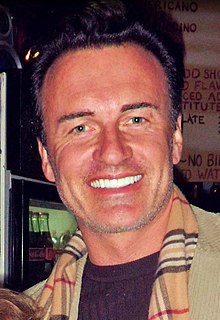A Quote by Billie Joe Armstrong
The main thing about the character [in the Ordinary World] is that he loves music, and he shares it with his daughter. He's having a mid-life moment, and it's a small moment, really. I think that the character actually really loves where he's at, in his life. He's just trying to have it make a little bit more sense while he figures out what he actually wants to do with it.
Related Quotes
At the time, I used to say, "We should market this like Everybody Loves Raymond. It's just a guy dealing with his family." Instead, it was irresistible to show all these funny people. So, I actually think this could be more inviting to a new audience because they can just watch one character, find out what's going on in his life, and then meet another character and find out what's going on in her life, and then see how it intersects the other one.
When I'm following what a character does in a book I don't have to think about my own life. Where I am. Why I'm here. My moms and my brother and my old man. I can just think about the character's life and try and figure out what's gonna happen. Plus when you're in a group home you pretty much can't go anywhere, right? But when you read books you almost feel like you're out there in the world. Like you're going on this adventure right with the main character. At least, that's the way I do it. It's actually not that bad. Even if it is mad nerdy.
So I don't think being an artist you can ever satisfy - the moment you do get satisfied is the moment you're done, really. I'm actually starting to bug out now, because it's not enough. I get joy and pleasure in the movies out there in the world that people are seeing, but for me, it's about making it. That's why I do it, is to make it, to deal with my life.
It's almost weirder sometimes when you don't have a full life experience with someone's ups and downs, knowing what they've been through. Sometimes a loss that just comes out of left field rings in a very weird way when you have actually sort of relied on this small moment with this or that person, as a moment that actually has defined something for you in your life.
Now when you transfer into the conscious parenting paradigm, you have to release those pressures and those fears... you actually think into the very ordinary but profound moment to moment connection to your children and you do away with those extraneous attachments to achievement or beauty or wealth or success. And while those things have their place, they don't overwhelm or override the life of the parent and child. Your life is actually suddenly liberated.
Really Edward Teach, Blackbeard, was actually tall, so he was literally larger than life and so he knew that and actually the more you read about him, you realize that he actually respected and knew about the theatricality and he'd rather take a ship by threatening and having the power of his personality and the threat of the oncoming danger to sway the ship to just acquiesce and just give up their cargo and so none of his crew got hurt and they would just take their bounty and he wouldn't have to kill anybody, but of course he earned that reputation, so he was no saint.
When you're no longer seeing yourself, in some ways. You're as close to being as you can be.I suppose that's consistent with the moment that the mind actually turns off, and is no longer questioning what you're doing. When the questions stop, that's when the real acting takes over. And trying to get to the point where the questions stop, "Would I do this? How do I feel about that as a character?" When those stop, and it's just doing X, Y, and zed, because that's what you'd do as this character, because you're inside this character somehow - that's when it really kicks off.
the life of Jesus recapitulates key elements in the earlier story of Israel. For a moment, as Jesus stands on the mountain giving the famous sermon, he is Moses. For a moment, answering his critics about his actions on the sabbath, he is David. For a moment, as he calls and names the twelve disciples, he is perhaps Jacob, bringing the twelve patriarchs into the world. For a moment, healing the sick and raising the dead, he is Elijah or Elisha. And so on. In the transfiguration he actually meets Moses and Elijah.
Improvisation, the main thing is it teaches you to be in the moment and present in the moment and be reactive and proactive for what's going on. Someone gives you something - a lot of actors are a little shut off, so they're just doing, "This is my character, these are my lines, I'm going to just send it to you then you send whatever you're sending." Improvisation teaches you to really be listening.



































